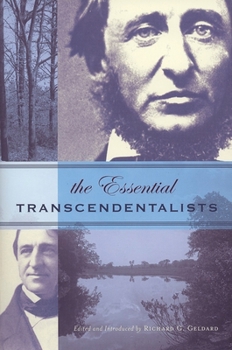The Essential Transcendentalists
Select Format
Select Condition 
Book Overview
Interest abounds in the work of the Transcendentalists, such as Emerson, Thoreau, and Bronson Alcott. Each year, tens of thousands of readers rediscover Transcendental thought in books and articles, and in visits to historic sites, such as Walden Pond. But few appreciate the truly mystical and contemplative qualities of the Transcendentalists, and the spiritual movements and figures they have since inspired. As Richard G. Geldard-one of today's...
Format:Paperback
Language:English
ISBN:158542434X
ISBN13:9781585424344
Release Date:October 2005
Publisher:Penguin Publishing Group
Length:272 Pages
Weight:1.55 lbs.
Dimensions:0.7" x 6.5" x 8.3"
Age Range:18 years and up
Grade Range:Postsecondary and higher
Customer Reviews
2 ratings
An appetizer preparing us for a main course
Published by Thriftbooks.com User , 18 years ago
When we think of Transcendentalism, we first turn to Ralph Waldo Emerson and Henry David Thoreau. But the literary movement was made up of more personalities than just those two men; and while "Nature" and "Walden" are key writings, they're not the only examples anyone can or should read. Hence the need and attraction of any transcendental anthology: it brings us multiple voices, perhaps even some unfamiliar or unusual ones. This volume represents a very small portion of those possibilities. Included are readings from Sampson Reed, James Marsh, Amos Bronson Alcott, Frederic Henry Hedge, and Margaret Fuller, in addition to Emerson and Thoreau. Geldard's focus here is captured by the word "essential." In his introduction, he clarifies that the word "not only speaks to the choices made from the huge body of material available but also reflects a vision of what is essential in measuring the value and meaning of human life as seen through the lives and minds of what has been come to be known as the Concord circle." A noble mission, indeed. The final section of the book studies the transcendental heritage as it continued in the words of Walt Whitman, Emily Dickinson, Wallace Stevens, Loren Eiseley, and Annie Dillard. "The Essential Transcendentalists" can be considered a basic introduction to the movement. One of its strong points is the historical treatment it provides in the opening section of the book. But while it includes portions of Emerson's "Nature" and Thoreau's "Walden," it ignores poets like Jones Very and William Ellery Channing as well as a number of essay writers and lecturers. The "essentials" as presented here stir us to seek out more. Readers craving more selections can turn to one of four substantial anthologies of transcendental writings: "The American Transcendentalists: Essential Writings" (Lawrence Buell, ed., 2006); "Transcendentalism: A Reader" (Joel Myerson, ed., 2000); "The Transcendentalists: An Anthology" (Perry Miller, 1977), or "The American Transcendentalists: Their Prose and Poetry" (Perry Miller, 1957). Each anthology has a focus, and surprisingly little overlap occurs when comparing their contents. And each contains a few jewels not found in any other contemporary anthology. Happy hunting!
Why I'm Reading This Book.
Published by Thriftbooks.com User , 19 years ago
Early east coast settlements in America brought to the new frontier a basic fear and distrust of nature, not really a healthy attitude for a young nation with a whole continent of conquest ahead of it. Thus the Salem witch craft trials, and further extremes of puritanism that must have perturbed thinking individuals of the early 1800s. The early transcendalists looked for a way of dialoguing with these people, taking care not to alienate them, but at the same time not giving up their pursuit of freedom and truth. Not much was available within this new American culture, so the transcendalists looked back to the wisdom of the ancients for inspiration. Emerson did a lot of the preliminary work in finding a new spiritual tone and vocabulary, blending the ancients, the puritans, the science of the day, into a set of ideas that the common man could grasp and run with as America began to develop its own unique culture. A hard core group of thinkers joined in with Emerson in espousing these new ideas. Some of their seminal writings are included in this volume. I read Geldard's other title, Spiritual Writings of Emerson, first, because I was impressed back in my English lit days of years gone by, with some of Emerson's ideas, and of course his clever quotes, but never really completely understood what he was all about, nor Thoreau, nor any of the transcendentalists. This book so clearly spelled out the essence of Emerson's message to me that I wanted to know more about the other writers in this movement. Why? Because the culture we have now is, well, in need of reform, and the voices and ideas out there are so many that it's confusing. So I'm thinking I start where Emerson started, by listening to what's inside of me instead of clinging to institutionalized thinking, what Emerson called "lowly listening". I've only read a little of Geldard's new book and it is teaching me how to listen.






